Iran Says Verification Of Sanctions Relief A Top Issue In Nuclear Talks

A main concern of Iran in talks to rescue the 2015 nuclear deal would be around ways to verify the lifting of US sanctions, Iran's Foreign Minister has said.

A main concern of Iran in talks to rescue the 2015 nuclear deal would be around ways to verify the lifting of US sanctions, Iran's Foreign Minister has said.
The talks, which aim to bring Washington and Tehran back into compliance with the 2015 nuclear pact aimed at curbing the Iranian enrichment program, were adjourned in June after hardline cleric Ebrahim Raisi was elected Iran's president.
Speaking during a visit to Syria on Saturday, Hossein Amir-Abdollahian reiterated that Iran would "soon" return to the nuclear talks with world powers, which include indirect negotiations with the United States, Iranian state media reported.
"Of course, we will soon return to the Vienna talks and we are keeping our eyes on the issue of verification and receiving the necessary guarantees for the implementation of commitments by the Western parties," state media quoted Amir-Abdollahian as saying.
He did not give details of the verification and monitoring mechanism Tehran was seeking.
Former president Donald Trump pulled the United States out of the nuclear pact in 2018 and reimposed sanctions that crippled Iran's economy, prompting Tehran to breach some of the accord’s nuclear restrictions.
Report by Reuters
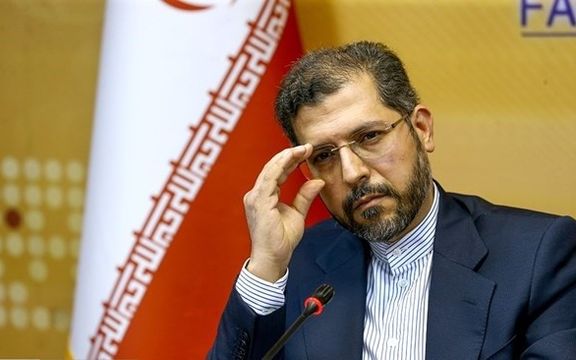
While the Iranian foreign minister has reiterated that his country will soon return to Vienna nuclear talks, it is not clear if Tehran has new preconditions.
Speaking during a visit to Syria, Iran's Foreign Minister Hossein Amir-Abdollahian reiterated that Iran would "soon" return to the nuclear talks with world powers, which include indirect negotiations with the United States. A main concern of Iran in any talks to rescue the 2015 nuclear deal would be around ways to verify the lifting of US sanctions, he said on Saturday.
Questions also linger if Iran is demanding unfreezing of some of its assets held in different counties. The foreign minister hinted last week that the US should release $10 billion to show goodwill.
In an interview with France 24 television cited by the official news agency IRNA Saturday, the foreign ministry spokesman Saeed Khatibzadeh repeated earlier statements that the new administration of President Ebrahim Raisi (Raeesi) has carried out dual reviews: one, now concluded, deciding to continue the talks, and a second reviewing details of talks to date.
According to IRNA, Khatibzadeh stressed that Iran would return to the talks more quickly than the three months it took the United States to open talks in April after President Joe Biden took office in January having pledged to return to the agreement, from which his predecessor Donald Trump withdrew in 2018. But it has been more than three months since the last round of talks in June.
The spokesman criticized the Biden administration for continuing Trump’s ‘maximum pressure’ sanctions despite campaign promises. "The most important issue is lifting all sanctions imposed on Iran," Khatibzadeh said.
European signatories of the deal – the JCPOA, Joint Comprehensive Plan of Action – have expressed concern that Iran is in no hurry to resume talks as it is gaining useful experience in running a nuclear program that has expanded since 2019.
Some pundits in Iran also see no rush. "If Iran was delaying the return to the talks to carry out economic reforms that could lessen the impact of sanctions this would be justified," international affairs analyst Hasan Beheshtipour told the Iranian Labour News Agency (ILNA) Friday.
But Beheshtipour also suggested that unravelling a complex network of sanctions needed negotiations with world powers, and that Iran should not expect all sanctions lifted overnight. Beheshtipour said that the cost of circumventing sanctions − adding $20 to the $5 production cost of each barrel of oil − justified a focus on oil and financial sanctions.
A conservative foreign policy expert, Heshmatollah Falahatpisheh backed Foreign Minister Hossein Amir-Abdollahian's call for the US to ‘unfreeze’ $10 billion of Iran's money as a goodwill gesture.
Falahatpisheh, who headed the parliament's National Security and Foreign Policy Committee 2018-19, said that instead of the fruitless "negotiation for the sake of negotiation" under President Hassan Rouhani, Amir-Abdollahian had suggested "a positive step" towards reviving the JCPOA.
Khatibzadeh has denied that Iran has preconditions for resuming talks, although some pundits have interpreted Amir-Abdollahian's demand for unfreezing Iranian assets as a toughening of Tehran’s approach.
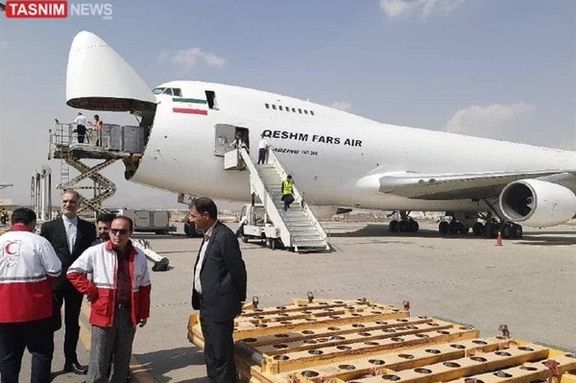
A conservative newspaper in Iran has suggested the Taliban is misusing Tehran’s aid, highlighting varying views in Iran on Afghanistan’s new rulers.
"Currently available information indicate that the aid sent by the Islamic Republic of Iran, which the terrorist Taliban group receives, is used as the group wishes and according to its needs and does not reach to those in real need," an editorial opined Saturday.
The Jomhuri Eslami (Islamic Republic) newspaper suggested that humanitarian assistance be sent directly to regions facing the worst crisis, directly by air to Bamiyan in central Afghanistan for instance, to ensure it reached those in need. It would be possible to supervise the distribution only if Iranian supervisors were there alongside local authorities to prevent misuse, the paper wrote.
In referring to the Taliban as ‘terrorists,’ Jomhuri Eslami differs from Kayhan newspaper, which has in recent months suggested the Taliban has changed over the past 20 years. Both Kayhan and Jomhuri Eslami, despite declining circulations, are influential in Iranian conservative and hardliner political circles.
In June a Kayhan commentary noted that the Taliban was no longer committing the same kind of sectarian crimes against Afghan Shiites and had stopped beheadings. But many in Iran, including some influential senior Shiite clerics, are skeptical of the Taliban and its pledges not to harm Afghanistan's Shiite minority.
The Iranian government and Red Crescent have sent several shipments of humanitarian aid to Kabul by air and land since September 15, when the first shipment of food was flown to the country in the same flight taking Iranian diplomats back to the Afghan capital.
The latest shipment, flown to Afghanistan October 5, included 50 tons of food and medicine, blankets and similar items needed for winter. On October 5, 94 tons of food and sanitary items, and 22 tons of oxygen capsules for use in hospitals, arrived by land.
The UN refugee agency said on Saturday the world should urgently provide promised aid to Afghanistan, warning that a lack of resources is hampering efforts to avert an economic crisis that could push fresh flows of refugees to its neighbors and beyond.
"The humanitarian crisis in Afghanistan remains really dire," Babar Baloch, spokesperson for the UN High Commissioner for Refugees, said in an interview in Islamabad.
"The focus has to be inside Afghanistan to avoid and avert another refugee crisis."
An official of the United Nations’ World Food Programme (WFP) said last month that the agency had asked for $200m in emergency aid to deliver food to Afghanistan's vulnerable people before winter.
According to the WFP, one in three Afghans faces severe hunger and 95 percent of families lack sufficient food. Countries prepared to offer humanitarian aid are concerned the Taliban would might seize the aid supplies and should not decide which regions or groups received it.
External funding for Afghanistan has been suspended since the Western military withdrawal from Kabul and the takeover of the central government by the Taliban on August 15. Wracked by corruption and nepotism, the US-backed authorities had relied on the US and other western donors for 80 percent of their budget.
The Taliban have offered the UN assurances on the safe passage and freedom of movement of humanitarian workers. While still considering whether to recognize the Taliban government, the US and other donors have pledged more than $1 billion in interim aid, a sum far short of the $100 billion a year the US spent on its 20-year war effort in the country.
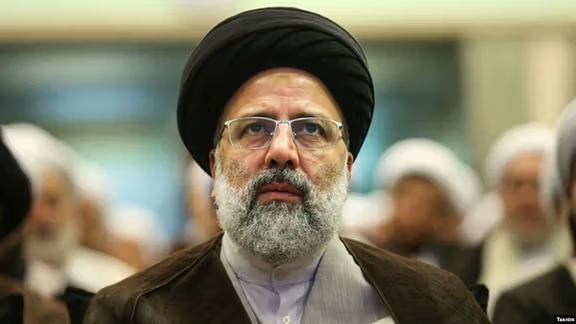
Iran’s President Ebrahim Raisi has accused the United States of being behind a suicide attack in Afghanistan on Friday that killed 46 people in a mosque.
Issuing a message of condolence, Raisi said the attack was carried out by people whose “anti-human and anti-religion nature is clear to all”. Referring to the possible role of Sunni Muslim extremists linked with the Islamic State group in the bombing, he added that this takes place “with support and plans of America”.
Raisi accused the US of creating and facilitating conditions to support extremists in Afghanistan and has prevented the fight against these groups.
Iran’s hardline president went on to say that his country is willing to help its “Afghan sisters and brother” against “new security plans” by the United States.
Former Afghan officials had frequently accused Tehran of covertly supporting the Taliban before the US withdrawal in August. Iran is also said to have provided safe haven to Al-Qaeda elements in the past 20 years.
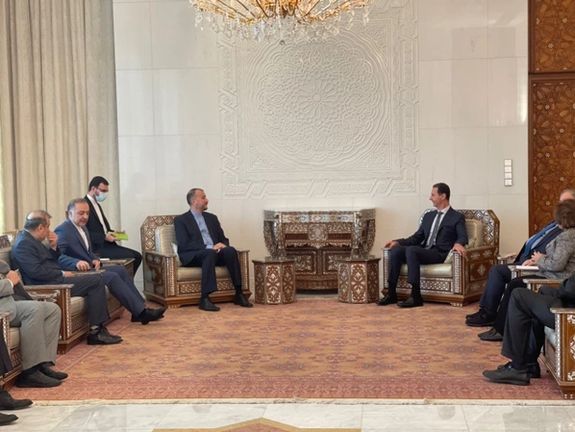
Hossein Amir-Abdollahian, foreign minister of the Islamic Republic of Iran visited Syria on Saturday and met with president Bashar al-Assad in Damascus.
The Islamic Republic News Agency, IRNA, reported that Amir-Abdollahian praised existing close relations and cooperation between Tehran and Damascus and said, “Conditions have shifted in Syria’s favor.”
Assad’s government has been isolated and sanctioned by Western and other countries since it began using military force against opponents after protests during the 2010 Arab Spring in the region.
Iran provided Assad with full military and substantial financial backing as the conflict turned into a civil war. Estimates say thousands of Iranian servicemen and Afghan and other proxy forces have been killed in Syria. Senior Iranian officials have said Iran has spent more that $30 to support Assad.
IRNA said that the Iranian foreign minister congratulated Assad for his government’s “military and international” successes and added that the diplomatic atmosphere as he witnessed during the United Nations General Assembly has shifted favor of Damascus.
Amir-Abdollahian also spoke about events in Afghanistan and said the US withdrawal shows the weakening of the Western axis.
Before arriving in Syria, Iran’s foreign minister visited Russia and Lebanon. Russia and Hezbollah in Lebanon are two other key allies of Assad.
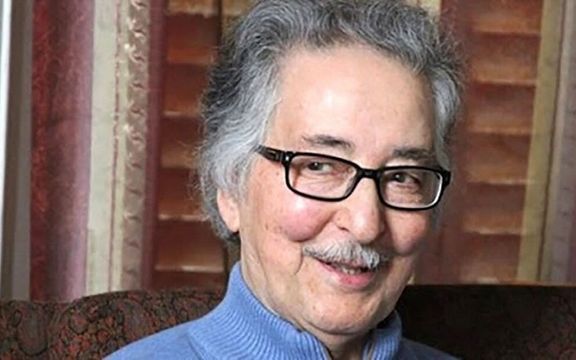
The Islamic Republic of Iran's first President, Abolhassan Banisadr who was ousted by clerics passed away at age 88 in a Paris hospital after 40 years in exile.
Banisadr who was the Foreign Minister in Iran's interim government that was set up after the 1979 Islamic revolution, was elected President with 10.8 million votes or 76.5 percent of ballots cast (67% of the electorate) in February 1980 and remained in power until June 1981 when hardliners at the Iranian parliament (Majles) ousted him.
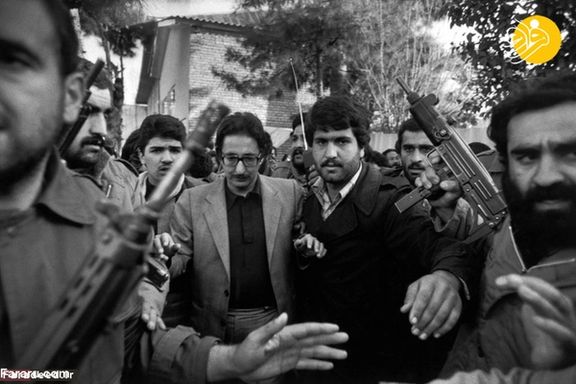
The son of a grand ayatollah in Hamadan, he was a student activist during the tumultuous 1950s and early 1960s when he supported Prime Minister Mohammad Mossadeq, who increasingly opposed Mohammad Reza Shah, and finally left Iran for France in 1963 where he studied economics while continuing his political activism against the monarchy.
In 1979, when Ayatollah Ruhollah Khomeini arrived from his exile in Iraq to Paris, Banisadr and his friends helped him find accommodation and settle in a Paris suburb. Khomeini trusted him as he knew his father very well. Then, Banisadr was seen interpreting for the ayatollah in interviews with international reporters. He came back to Iran with Khomeini in February 1979.
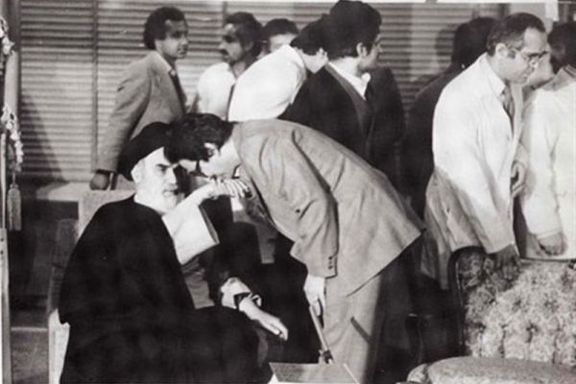
His presidency was constantly challenged by powerful clerics in Khomeini’s inner circle led by Mohammad Beheshti, Akbar Rafsanjani and Ali Khamenei who first ousted the "liberal' government of Prime Minister Mehdi Bazargan, and then completed their takeover by striping Banisadr of the presidency.
In an interview with Iran International TV, the Secretary of Iran's National Front Hossein Mousavian characterized Banisadr as "A man of principles." Banisadr was a member of the pro-Mossadeq national Front of Iran before the 1979 revolution. While living in Paris as a young man, Banisadr led the Islamic wing of the National Front that was known at the time as the Islamic Association of Students.
Iran analyst Morteza Kazemian said on Iran International TV that Banisadr was "an independent nationalist figure, who believed in Iran's territorial integrity and strived to strengthen social movements in Iran and fight clerical despotism."
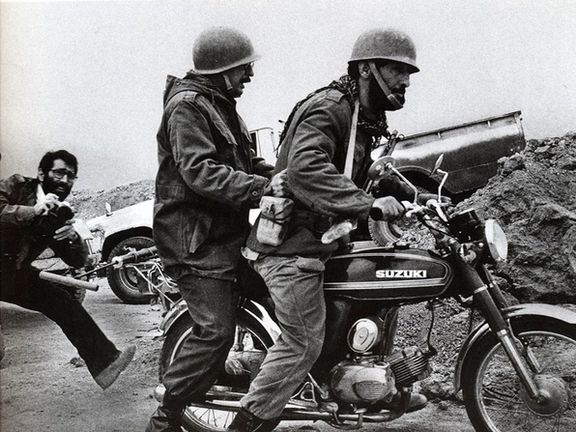
Kazemian also said that Banisadr adhered to his "principles" and that was probably why the Iranian government attempted to assassinate him in Paris at least twice.
Opposition figure Hassan Shariatmadari said in another interview with Iran International TV on Saturday that "Banisader was a true pro-Mossadeq political figure who supported Iran's independence and fought for justice and freedom."
According to Shariatmadari, Banisadr's testimony at the court investigating the Mikonos case in Germany, where he exposed the regime's state-sponsored terrorism and assassination of opposition figures, caused a major disgrace for the Islamic government."
Shariatmadari said that "Banisadr strongly opposed the Islamic Republic's underlying theory of the Guardianship of Chief Jurisconsult (Velayat Faqih) which led to the totalitarian regime we see as clerical rule in Iran today." He added that Banisadr started a struggle against the clerical rule but had no chance to win, yet he adhered to his principles and left an example of a struggle against dictatorship.
Banisadr's critics say he was mistaken in the early 1980s believing that Khomeini was a democratic leader and failed to realize that the founder of the Islamic Republic was a populist who deceived everyone with his democratic slogans. Critics inside Iran, mainly clerics who always opposed him, including former President Akbar Rafsanjani have said that Banisadr was misled to believe that more than 11 million votes he won in the presidential election made him superior to everyone else, mindless of the fact that this was first of all a vote to the Islamic regime and its leader Ayatollah Khomeini.